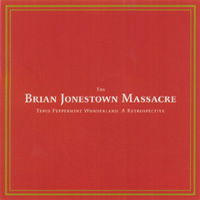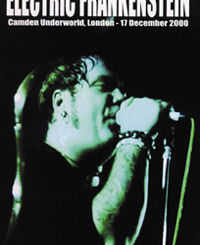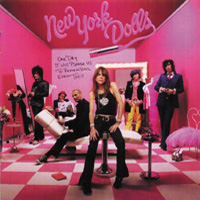 The Brian Jonestown Massacre
The Brian Jonestown Massacre
Tepid Peppermint Wonderland: A Retrospective (Tee Pee)
by Brian Varney
The Brian Jonestown Massacre is a band for whom excess is a way of life. Excessive band member turnover (over 40 members in 10 years), excess productivity (six albums released between 1995-1998), and an egomaniac by the name of Anton Newcombe residing in the eye of the storm, where fake British accents and on-stage fights are commonplace. To the newcomer, trying to figure out where to start can become quite overwhelming, since any band with this many albums is bound to have its high and low points.
Tepid Peppermint Wonderland is an ideal starting point for just such a newcomer. It also has a nice chunky feeling for those, like myself, who always seem to like a song or two from each new TBJM album, but never enough to warrant actually keeping the album. Seriously, I’ve probably owned five or six of their albums, but I end up never playing them all the way through and, eventually, they make their way elsewhere.
Over the course of two shiny plastic discs and 38 songs, some from albums, some from singles, and some unreleased live recordings, Tepid Peppermint Wonderland: A Retrospective presents a pretty good case for The Brian Jonestown Massacre being one of the best current examples of what music folk back in the ’60s and ’70s called a “singles band.” Of course, real bands don’t really release singles anymore, so the term is a bit antiquated, but the logic remains essentially the same. While the band’s albums tend to be a bit inconsistent, a single containing any two of these songs would be pretty good inspiration to dance around your room for seven or eight minutes a few times a day.
My mentioning of the era of the singles band works as a nice segue to a description of the band’s sound, which is firmly entrenched in the style of rock music popularized in the late ’60s by their namesake band, The Rolling Stones, as well as more underground bands working the same terrain, many of whom, such as Love, The Seeds, and The Remains, would later be anthologized on collections such as Nuggets. The Brian Jonestown Massacre is not strictly a retro exercise, but the influence of such bands and of the late 1960s era itself is responsible for the largest portion of the band’s identity. The pot-haze drama of “When Jokers Attack” or “If Love Is the Drug” practically scream for vinyl surface noise and a full-size LP sleeve from which seeds and stems periodically escape.
(www.teepeerecords.com)



